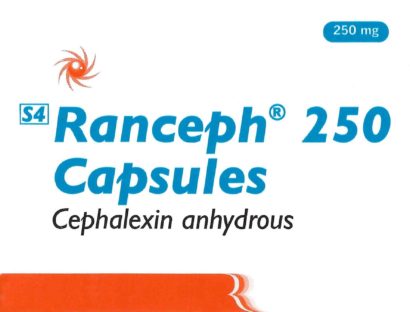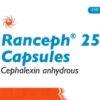Ranceph (250mg capsule x 40)
$11.84
Ranceph (250mg capsule) is a medication containing the active ingredient Cefalexin. It belongs to the class of antibiotics known as cephalosporins and is commonly used to treat various bacterial infections by inhibiting the growth of bacteria. It is available in capsule form with a strength of 250mg. Ranceph helps to combat infections effectively and is prescribed under medical guidance.
Ranceph (Cefalexin 250mg Capsule)
Description: Ranceph is a brand name for the antibiotic medication Cefalexin. The active ingredient in Ranceph is Cefalexin, which belongs to a class of antibiotics called cephalosporins. Cefalexin is used to treat a variety of bacterial infections by stopping the growth of bacteria.
Dosage and Administration: The dosage of Ranceph (Cefalexin) can vary depending on the type and severity of the infection, as well as the patient’s age and overall health. The following dosage information is a general guideline:
- Adults and Adolescents (over 15 years old):
- For most infections: The typical dose is 250 mg taken every 6 hours or 500 mg taken every 12 hours. This can be adjusted based on the severity of the infection.
- For streptococcal throat infections and skin infections: A common dose is 500 mg every 12 hours.
- Children (based on weight):
- The typical dose is 25 to 50 mg per kilogram of body weight per day, divided into smaller doses.
It’s essential to complete the full course of treatment even if you start feeling better before the medication is finished. Stopping antibiotics too soon might not fully eradicate the infection and can lead to antibiotic-resistant bacteria.
Usage Information:
- Take Ranceph (Cefalexin) capsules with a full glass of water.
- You can take it with or without food. If it causes an upset stomach, taking it with food might help.
- Swallow the capsule whole, and do not crush, chew, or open it, unless your doctor advises otherwise.
- If you miss a dose, take it as soon as you remember. If it’s close to the time for your next dose, skip the missed dose and resume your usual dosing schedule.
- Do not double the dose to make up for a missed one.
- Always follow your healthcare provider’s instructions regarding dosage and usage.
Precautions:
- Inform your doctor if you have any allergies, especially to antibiotics.
- Tell your doctor about your medical history, especially if you have kidney problems or a history of gastrointestinal diseases.
- Inform your doctor of any other medications you’re taking to prevent potential drug interactions.
- If you experience severe diarrhea during or after using Cefalexin, contact your doctor. This could be a sign of a bacterial infection of the colon that requires immediate treatment.
- Cefalexin might reduce the effectiveness of birth control pills, so consult your doctor about alternative methods if you’re using hormonal contraception.
Side Effects: Common side effects might include nausea, vomiting, diarrhea, upset stomach, and skin rash. If you experience severe side effects like difficulty breathing, swelling of the face, lips, tongue, or throat, or signs of an allergic reaction, seek medical attention immediately.
| Weight | 0.06 kg |
|---|---|
| Dimensions | 3 × 3 × 1 cm |
Related products



